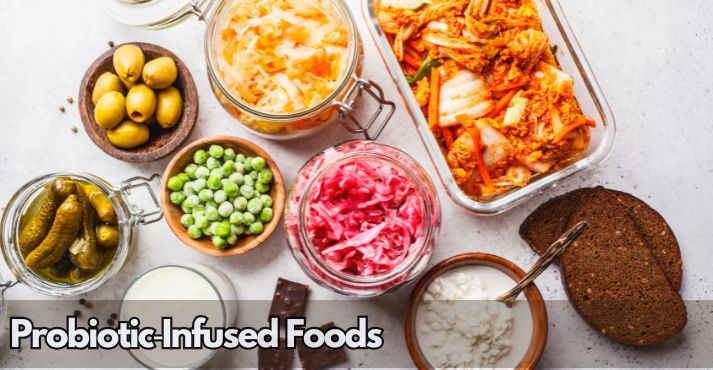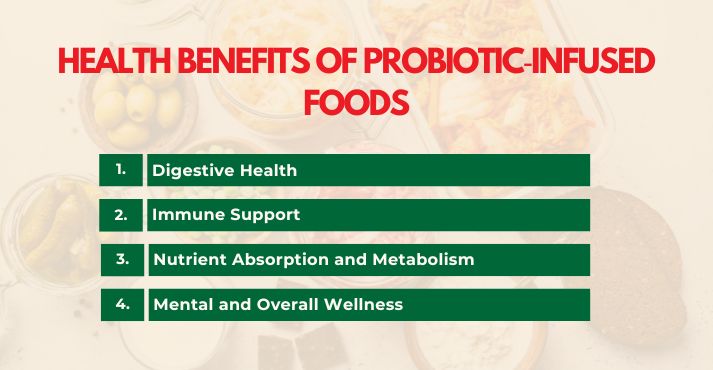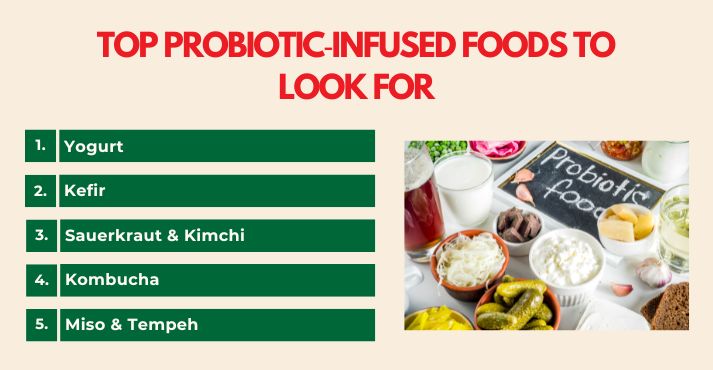Most of us have felt that heavy, uncomfortable feeling after a big meal or have dealt with slow digestion at some point. Our gut health affects so much more than we think, from our mood to our energy levels.
Taking care of it does not have to mean complicated diets or strict meal plans. One simple and natural way to support a healthy gut is by adding probiotic-infused food products to your meals.
These foods contain live, good bacteria that help keep the digestive system in balance. Yogurt, kefir, miso, and kombucha are just a few tasty examples that can easily fit into everyday life.
In this blog, we will explore the role of probiotic-infused food products in maintaining gut health. We will also examine the nature of these foods, their internal functions, benefits, popular options, and simple ways to incorporate them into your diet.
What Are Probiotic‑Infused Foods?

Probiotic‑infused foods are everyday foods that contain live, good bacteria or yeasts. When consumed, these friendly microbes help maintain a balanced digestive system and support overall gut health.
Some common examples are yogurt, kefir, kimchi, sauerkraut, kombucha, miso, tempeh, and pickles. Many of these foods have been part of traditional diets for centuries, valued for both taste and health benefits.
These foods are made through fermentation. During this process, natural bacteria or yeasts break down sugars and starches in the food. This not only gives these foods their tangy flavor but also fills them with live, helpful microbes.
Interest in probiotic‑infused foods has grown worldwide. The market was valued at $65.66 billion in 2024 and is expected to reach $140.34 billion by 2031.
This shows that more people are paying attention to gut-friendly choices and adding these foods to their daily routines.
People also look for clean label ingredients, choosing products with simple, easy-to-understand lists rather than artificial additives. Probiotic foods often align with this preference, making them a popular choice for those who want to eat healthier without overthinking it.
How Probiotic Foods Work in the Gut
When you eat fermented food probiotics like yogurt, kimchi, or sauerkraut, you introduce live, helpful microbes into your digestive system. These microbes support gut health in a few important ways.
First, they help crowd out harmful microbes by competing for space and nutrients. This makes it harder for unwanted bacteria to grow and cause problems.
Second, they produce helpful metabolites known as short-chain fatty acids (SCFAs), including butyrate and acetate. These acids lower gut pH, which supports a strong gut lining and encourages good bacteria to thrive.
Third, they help with nutrient absorption. The acids and enzymes released during fermentation make it easier for the body to break down food and absorb essential vitamins and minerals.
It is important to recognize that these microbes typically do not reside in the gut permanently. They pass through and provide benefits as they move along, a process known as transient colonization.
This is why eating probiotic foods regularly is more beneficial than eating them only occasionally.
There is also a strong connection between probiotics and fiber. Many of these foods contain natural fiber, which acts as food for the good bacteria. This combination supports a healthy and diverse gut environment.
Today, even suppliers in the food service industry focus on using fermented food probiotics with fiber-rich ingredients to create meals that promote better digestion and overall wellness.
People also look for gut health probiotics that come from clean, simple recipes without artificial additives.
Health Benefits of Probiotic‑Infused Foods

Probiotic‑infused foods offer more than just good taste. They support digestion, help strengthen the immune system, enhance the body’s nutrient use, and even impact mental wellness. Let’s look at these benefits more closely:
1. Digestive Health
Eating probiotic-infused foods regularly can help improve bowel movements and alleviate issues such as irritable bowel syndrome. Certain probiotics have been shown to reduce bloating, stomach pain, and discomfort in individuals with IBS.
They also support enzyme production, making it easier for the body to break down food and absorb nutrients.
2. Immune Support
Good bacteria found in these foods help lower inflammation and maintain a strong gut barrier. A review of 39 trials found that probiotics can reduce inflammatory markers, including CRP and TNF-alpha, which are associated with various common health issues. A stronger gut barrier also helps block harmful pathogens and supports overall immunity.
3. Nutrient Absorption and Metabolism
A healthy gut lining allows the body to absorb vitamins and minerals more effectively. Probiotic foods can help improve levels of essential nutrients, including calcium, magnesium, and B vitamins.
Some studies suggest these foods may also support healthy cholesterol levels by affecting how fats are broken down in the body. These benefits show why many people include them in their daily meals and why they have become a focus in the food and beverage market.
4. Mental and Overall Wellness
The gut and brain are deeply connected through what is called the gut-brain axis. Good gut health has been linked to improved mood, enhanced cognitive function, and reduced stress.
Some early research shows that probiotics might help improve mood and reduce mild anxiety, though more studies in humans are still needed.
These benefits of probiotic foods make them a smart choice for anyone looking to support their health naturally. Many companies in the food industry are now using sustainable sourcing to offer products that are both good for people and better for the environment.
Top Probiotic‑Infused Foods to Look For

These everyday options offer gentle and reliable ways to boost your gut health. Many cafes and food suppliers now showcase small-batch kombucha, artisanal yogurts, and unique fermented items at farmers’ markets and wholesale vendor events.
1. Yogurt (Contains Lactobacillus, Streptococcus)
Yogurt stands out as one of the most accessible probiotic foods around. It helps improve digestion and can ease lactose intolerance by introducing enzymes that break down dairy.
For best results, choose unsweetened varieties labeled “live cultures.” These ensure that friendly bacteria remain active when consumed.
2. Kefir (Diverse Strains)
Kefir offers even more microbial variety than yogurt, including both bacteria and yeast strains. It has a thinner, drinkable texture that makes it perfect for smoothies or sipping on its own.
Because kefir’s microbial strains work well even in lower-lactose environments, many people with dairy sensitivity tend to tolerate it better than yogurt.
3. Sauerkraut & Kimchi (Plant-based Probiotics)
These fermented cabbage dishes are rich in Lactobacillus and bring a burst of flavor along with fiber and antioxidants. Try adding small servings as side dishes or toppings on salads and sandwiches to get gut benefits and extra nutrients in one go.
4. Kombucha (Fermented Tea)
Kombucha is a fizzy, tangy drink made from fermenting black or green tea with a symbiotic culture of bacteria and yeast. It delivers probiotics alongside organic acids and antioxidants. It’s best to opt for low-sugar brands or make your own to ensure you’re truly reaping its benefits.
The kombucha market is projected to grow from $2.4 billion in 2024 to $5.9 billion by 2029, indicating strong demand for functional food probiotics and healthier beverage options.
5. Miso & Tempeh (Soy-based Fermentation)
Miso is a salty paste often used in soups, while tempeh is a firm, protein-rich soy cake. Both come from fermented soybeans and are rich in probiotics and B vitamins. They make excellent staples for plant-based diets or alternatives to meat.
Choosing the Best Probiotic‑Infused Foods
Paying close attention to labels and ingredient lists can help you choose products that truly support gut health. Here are some tips:
- Check for “live and active cultures” or CFU counts: Look for the phrase “live and active cultures” on the label to ensure the product contains live probiotics. Some high-quality products also list the CFU (colony-forming units), which indicates the number of live microorganisms in each serving. Choosing products with clear labeling helps you maximize the benefits of probiotic-infused foods.
- Choose raw or unpasteurized options: Pasteurization can kill helpful bacteria. Raw sauerkraut, kombucha, kefir, and yogurt usually provide stronger probiotic benefits.
- Avoid ultra-processed probiotic foods: Items with high sugar content, artificial flavors, or additives can counteract the gut health benefits. Simple and minimally processed products are often the better choice.
- Consider personal sensitivities: If you have a dairy or histamine intolerance, consider alternatives such as coconut-based yogurt or low-histamine fermented vegetables.
Many restaurants and wholesale vendors use menu psychology to highlight probiotic-rich options, often labeling them as “gut-friendly” or “live culture” to guide customers toward these choices.
Conclusion
Probiotic‑infused foods support gut health in many ways, from helping with digestion to boosting immunity and improving nutrient absorption. They offer a natural and enjoyable way to take care of your body without requiring significant dietary changes.
The key is to add these foods in small, steady amounts rather than relying on a single serving or occasional snack. A spoonful of yogurt in the morning, a glass of kefir, or a few bites of kimchi with dinner can make a real difference over time.
By selecting high-quality options and listening to your body’s needs, you can enjoy the lasting benefits of these simple yet powerful foods.











